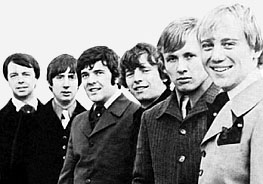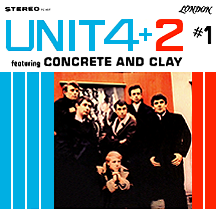UNIT FOUR PLUS TWO
Concrete and Clay
In the mid-'60s, Britain's old-guard Decca Records was competing in a heated environment. Ever since the surge of beat groups and their solo counterparts that had begun topping the U.K. charts in 1963, Decca had struggled a bit to keep up with Parlophone (The Beatles, Billy J. Kramer and the Dakotas, Cilla Black), Pye (The Searchers, The Honeycombs, The Kinks, Sandie Shaw) and EMI's Columbia (Gerry and the Pacemakers, The Dave Clark Five, Peter and Gordon, The Animals, Georgie Fame, The Seekers) in the race to stack up number one hits. The stodgiest of the U.K.'s record companies answered with "Diane" by The Bachelors, stylistically a decade or so out of step in comparison to the others despite having reached the top spot. Things started coming together for Decca when "It's All Over Now" by The Rolling Stones hit the apex in 1964, followed by The Moody Blues (with "Go Now") in early '65. Then in March and April the label pulled a nice little coup with consecutive number one hits for three different artists: Tom Jones' "It's Not Unusual," Rolling Stones smash "The Last Time" (their third chart-topper) and Unit Four plus Two - who? - with "Concrete and Clay."
They had actually been called Unit Four earlier, but the number of band members fluctuated and rather than change the name when the band expanded to six, they just added plus Two (though at different times it could have been plus One...or Three). The group's founding members, led by Brian Parker, hailed from Hertfordshire County, a stone's throw from The Zombies' stomping ground. Parker had been the lead guitarist for instrumental band The Hunters and was key in forming The Roulettes, which functioned primarily as a backup band for teen idol Adam Faith. He put Unit Four together with guitarist David "Buster" Meikle, also of the Hunters, and two other friends sporting nicknames, each more odd than the one before: bassist Peter "The Count" Moules and pianist/guitarist/lead singer Tommy "Sweat" Moeller. Decca signed the act and during the first sessions Parker brought in two former Roulettes mates, keyboard player Russ Ballard and drummer Bob Henrit; they weren't official members but didn't go uncredited either, hence the plus Two designation (altered slightly to Unit 4+2 on album releases).
First single "The Green Fields," a folkish, midtempo track, made for a promising start, appearing briefly on the U.K. charts in February 1964. Due to health issues, Parker took a back seat, allowing the band to replace him with guitarist Howard "Lem" Lubin while he continued making contributions as a songwriter in lieu of changing the name to Unit Four plus Three. The third single did the trick; after the Latin-tinged "Concrete and Clay," penned by Parker and Moeller, knocked the Stones out of the number one slot in early April of '65, it crossed over to American shores for a nice but unexceptional chart run in May and June. Maybe the record would have done better if it hadn't been fighting off a cover version by American singer Eddie Rambeau the entire two months.

Rambeau, born Edward Fluri in Hazelton, Pennsylvania, began recording for Philly's Swan Records just after high school graduation in 1961. He made a minor chart appearance in 1963 duetting with Marcy Jo on a medley of pop standards "The More I See You" and "When I Fall in Love," but made a better impression as a songwriter in collaborations with Frank Slay, Bud Rehak and Bob Crewe, with hits by Mark Valentino ("The Push and Kick"), Tracey Dey ("Here Comes the Boy") and, most successfully, Diane Renay ("Navy Blue" and "Kiss Me Sailor"). He joined Crewe's DynoVoice Records at its inception in 1965, recording "Concrete and Clay," which turned out to be his only hit. Eddie's version made it to the top 40 but Unit Four plus Two's original was bigger, though nowhere near the high profile it attained in England and other countries.
The follow-up, "You've Never Been in Love Like This Before," was a breezy, midtempo magnet and performed well in the U.K., hitting the top 20 in June '65. It charted briefly in the U.S. a few weeks later, while "Hark," in October, had even less luck. One last minor U.K. hit, "Baby Never Say Goodbye," sounded promising but disappeared after just one week on the chart. With a couple of years remaining on their Decca contract, the band continued recording and doing live dates. Ballard and Henrit became official members in 1967, legitimizing the name (Unit Six could have been used at this point). Meikle and Moules (they of the nifty nicknames "Buster" and "The Count") quit the band and I suspect after that the lineup wasn't necessarily set at exactly six on any given Wednesday. The nickname tradition persevered, though; bassist Rod "Humble" Garwood and drummer Hugh "Pygmy" Halliday logged some late-decade time with the group, which broke up for good in 1970. Lubin was the bassist for Christie ("Yellow River") in the early 1970s. Ballard and Henrit joined with ex-Zombie Rod Argent, holding their heads up as part of Argent into the mid-'70s.


